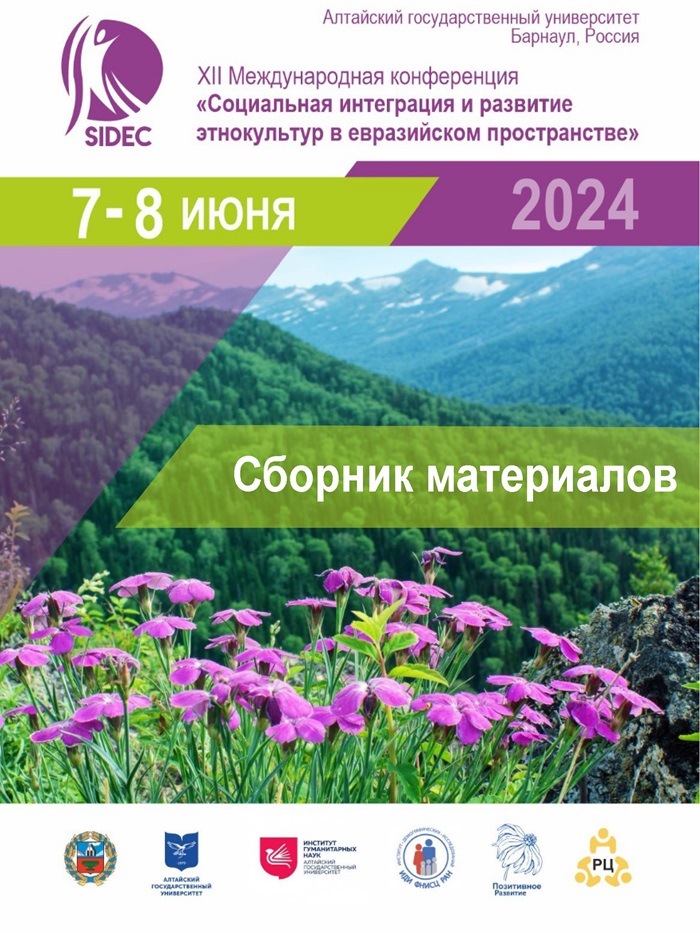ECHO CHAMBERS: INTEGRATION AND POLARIZATION IN THE CONTEXT OF DIGITAL CULTURE
Main Article Content
Abstract
The dynamics of the development of digital culture give rise to new information and communication phenomena that influence the configuration of online and offline interactions. Such phenomena include "echo chambers" and "filter bubbles", which are the subject of this study. The analysis of the essence and operating conditions of these information formations is based on experimental data from Russian and foreign scientists. It is substantiated that the machine mechanisms of personalization of social media stimulate the formation of information bubbles, the communication processes in which have opposite tendencies: towards unification based on common axiological patterns and towards isolation, polarization with other communities based on the principle of negative identification. Factors that reduce the effectiveness of smart algorithms and neural network filters have been identified. On this basis, a conclusion was made about the possibility of going beyond the boundaries of closed "echo communities", and the resource potential of the user is associated with cognitive-psychological and IT-skills.
Downloads
Download data is not yet available.
Article Details
How to Cite
[1]
Leontyev, G. and Leontieva, L. 2023. ECHO CHAMBERS: INTEGRATION AND POLARIZATION IN THE CONTEXT OF DIGITAL CULTURE. Social Integration and Development of Ethnic Cultures in the Eurasian Space. 1, 13 (Apr. 2023), 183-188.
Section
Статьи
References
1. Бодрийяр Ж. Пароли. От фрагмента к фрагменту. М., 2006. 200 с.
2. Леонтьев Г.Д., Леонтьева Л.С. Интеграция культур и конвергенция технологий // Социальная интеграция и развитие этнокультур в евразийском пространстве: сборник материалов международной научной конференции / отв. ред. С. Г. Максимова. 2022. Т. 1. № 11. С. 157-161.
3. Digital 2023: Global Overview Report. URL: https://datareportal.com/reports/digital-2023-global-overview-report
4. Паризер Э. За стеной фильтров. Что Интернет скрывает от вас? / пер. с англ. А. Ширикова. М., 2012. 304 с.
5. Sunstein C. R. Echo chambers. Princeton University Press, 2001. 108 p.
6. Cinelli M., De Francisci Morales G., Galeazzi A., Starnin M. The echo chamber effect on social media. PNAS. Computer Sciences. Vol. 118 No. 9. 2021. URL: https://doi.org/10.1073/pnas.2023301118
7. Chopra F., Haaland I., Roth Ch. The Demand for News: Accuracy Concerns Versus Belief Confirmation Motives (2022). CESifo Working Paper No. 9673. 111 р. URL: http://dx.doi.org/10.2139/ssrn.4082578
8. Moravec P., Kim A., Dennis A.R., Minas R. Do You Really Know If It’s True? How Asking Users to Rate Stories Affects Belief in Fake News on Social Media (October 22, 2018). Kelley School of Business Research. Paper № 18-89. 27 р. URL: http://dx.doi.org/10.2139/ssrn.3271057
9. Мартьянов Д.С., Мартьянова Н.А. Селективная модерация в условиях виртуальной публичной сферы // Социодинамика. 2019. № 12. С.74-85. URL: https://nbpublish.com/library_read_article.php?id=31759
10. Брунс А. Реальна ли стена фильтров? / под науч. ред. А. Павлова. М., 2023. 120 с.
2. Леонтьев Г.Д., Леонтьева Л.С. Интеграция культур и конвергенция технологий // Социальная интеграция и развитие этнокультур в евразийском пространстве: сборник материалов международной научной конференции / отв. ред. С. Г. Максимова. 2022. Т. 1. № 11. С. 157-161.
3. Digital 2023: Global Overview Report. URL: https://datareportal.com/reports/digital-2023-global-overview-report
4. Паризер Э. За стеной фильтров. Что Интернет скрывает от вас? / пер. с англ. А. Ширикова. М., 2012. 304 с.
5. Sunstein C. R. Echo chambers. Princeton University Press, 2001. 108 p.
6. Cinelli M., De Francisci Morales G., Galeazzi A., Starnin M. The echo chamber effect on social media. PNAS. Computer Sciences. Vol. 118 No. 9. 2021. URL: https://doi.org/10.1073/pnas.2023301118
7. Chopra F., Haaland I., Roth Ch. The Demand for News: Accuracy Concerns Versus Belief Confirmation Motives (2022). CESifo Working Paper No. 9673. 111 р. URL: http://dx.doi.org/10.2139/ssrn.4082578
8. Moravec P., Kim A., Dennis A.R., Minas R. Do You Really Know If It’s True? How Asking Users to Rate Stories Affects Belief in Fake News on Social Media (October 22, 2018). Kelley School of Business Research. Paper № 18-89. 27 р. URL: http://dx.doi.org/10.2139/ssrn.3271057
9. Мартьянов Д.С., Мартьянова Н.А. Селективная модерация в условиях виртуальной публичной сферы // Социодинамика. 2019. № 12. С.74-85. URL: https://nbpublish.com/library_read_article.php?id=31759
10. Брунс А. Реальна ли стена фильтров? / под науч. ред. А. Павлова. М., 2023. 120 с.

